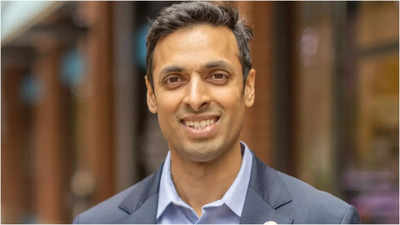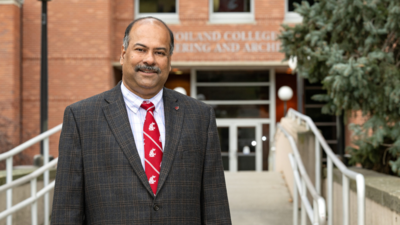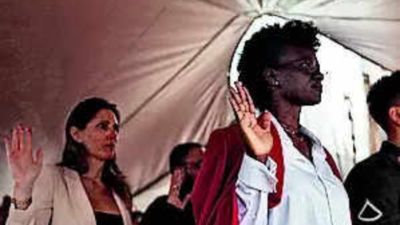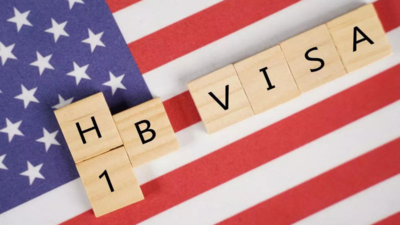Suhas Subramanyam, tipped to be new member of Samosa Caucus, supports easier path to green card for H-1B holders | World News


TOI correspondent from US: Democrat Suhas Subramanyam, a state senator in Virginia, is not a newbie in US politics and was first elected to the state’s legislative body (general assembly) in 2019 as a state delegate. Now running for the US House of Representatives from Virginia’s 10th district, he is tipped to become the sixth member of the ‘Samosa Caucus’ of Indian American lawmakers in the US Congress. The state senator, whose parents immigrated to the US to pursue the American dream, has earlier been a staffer on Capitol Hill (the seat of US government) and served in the White House as advisor to President Barack Obama. Subramanyam, who has been endorsed for the House of Representatives seat by incumbent Democratic Congresswoman Jennifer Wexton, spoke to Ishani Duttagupta of the Times of India, on a range of issues including his support for immigration reform and the role his Indian American background has played in shaping his political views. Edited excerpts from the interview.
From policy aide on Capitol Hill and technology advisor to President Obama, you have had diverse political experience. What are some of the important experiences that you will be taking with you, if elected to the US House of Representatives?
I will be taking all my experiences with me to the US House – from advisor to President Obama to advisor on Capitol Hill and a member of the community in Virginia, who has roots here and has served as state senator. I think it is important that we listen to our constituents and be responsive to some of their needs. I think that is the most important of my experiences – my time in the community.
Immigration is an important issue for many Indians who live and work in the US. Will you be addressing immigration reforms?
Immigration is a personal issue for me. My family came to the US in the late 70s and it took them only three months to get a green card. Now it takes some people as long as 15 to 20 years and many are even telling me that it will be a lifetime wait, and they may never get a green card because of the antiquated immigration system that we operate under. I would like to see comprehensive immigration reform. There is a lot of talk about border security; which is fine. I support border security; but we need to talk more about legal immigration. Especially about what we are going to do about people who are on visas like the H-1B. I would like to see us lift the country quotas which I think will be especially good for Indian Americans and a lot of other immigrants from other countries too. I don’t think those quotas are fair. Even if we disagree with what to do about undocumented immigrants; we should agree on border security and legal immigration and try to move those things forward.
Will you champion lifting of country quotas for green cards?
Right now in my community there are a lot of people who came on H-1B visas, to work mostly in the technology field, and there are other programmes for agricultural workers that are mostly from Mexico or central America who come here legally to help with seasonal work on temporary visas. Both groups should have a path to citizenship especially because of their tremendous contribution to our economy and country. Without them we would be in a very difficult situation, economically.
I come from an immigrant family that has benefitted from a system where people had a quicker path to citizenship and perhaps that gives me a biased view. I want to make sure that a legal immigration path to citizenship is available for people who are on these work visas. I think that it will be good for our country in the long term.
The Indian Americans in the US House of Representatives are informally called the Samosa Caucus – if elected you would be the sixth member of the group – do you think this is an important ‘lobby’ in the Congress with respect to the India-America relationship?
I am proud to be Indian American, though it’s not what I lead with when explaining why I am running for the elections. But it is something that I consider to be very important to my story – and it’s also something that has shaped me. I was raised Indian American and went to India as a kid; but with that said I look at things from the US perspective predominantly. A strong US-India relationship is good for both the countries and this world. So even with my strong connection to India from my heritage, I also look at the situation objectively and feel that a strong US-India relationship benefits us in the US tremendously. I think that the policy can be best furthered by economic relationships rather than arms deals. The economic relationship between US and India is incredible and powerful. In the long-term, I do see the US having defence co-operation with India; but what makes the relationship strong and powerful are the economic ties. I want to continue on the path to those and improve on them.
As state senator and as a candidate for Congress; what are the issues that you have highlighted?
I have always focussed on economic issues as member of the Virginia General Assembly. I worked very hard on bringing down the cost of prescription drugs. I also tried to make sure that utility bills didn’t over-charge customers. Where I live, there are very high tolls on roads; I passed legislation to prevent further increases. I have always cared a lot about the cost of living here, and that seems to be one of the top issues in this election. I also care about making sure we have access to healthcare. Right now, women are specially concerned about reproductive rights in America; my focus is certainly to support reproductive rights but also to bring down the cost of healthcare generally, so more people have access to good healthcare. That has always been my concern.
Education is also something that is very important to me. I want to make sure that schools have all the funds that they need. Here a lot of teachers are underpaid and can’t afford to live in our community. I want to make sure that there is more affordable housing and better pay for teachers so that we can afford to retain them.
Is your Indian heritage important for you?
I celebrate all Indian holidays and also have family that still lives in India. So, I do have a bond with that country naturally. We also have a growing Indian population in my district and they understand the historic nature of my candidacy – the first ever Indian American in Congress from the East coast. But I also want to make sure that the people in my constituency are my priority and that the economy that we have here is strong with a focus on healthcare and education. I want people here to be empowered and have a voice.
Do you see many other young second generation Indian Americans like yourself choosing a career in public life, policy and politics?
I do see a change and it’s happening pretty quickly – we’re seeing that we could have an Indian American President and there are also people on the Republican side who have run for president. We are also seeing Indian Americans run and win at the local level which I think is very important. And certainly at the state level, after I was elected, there have been others elected as well. I think it is important to get engaged and involved politically. When my parents came to the US, they had to think of how to make ends meet and how to survive in this place. They told me to pick a profession that is stable. But I understand that this as one way of giving back to the community. And now other Indian Americans are also seeing it that way which is why we are seeing more running for offices. I want to help and encourage Indian Americans and other South Asians including Nepalese, Pakistanis and Bangladeshis to run for Congress and achieve better representation. While I could be the sixth or seventh member of the ‘Samosa Caucus’, in long term I feel there should be more of us becoming a part of political process, and they don’t necessarily always have to win elections. It is important to make our voice matter, next week and later as well.




